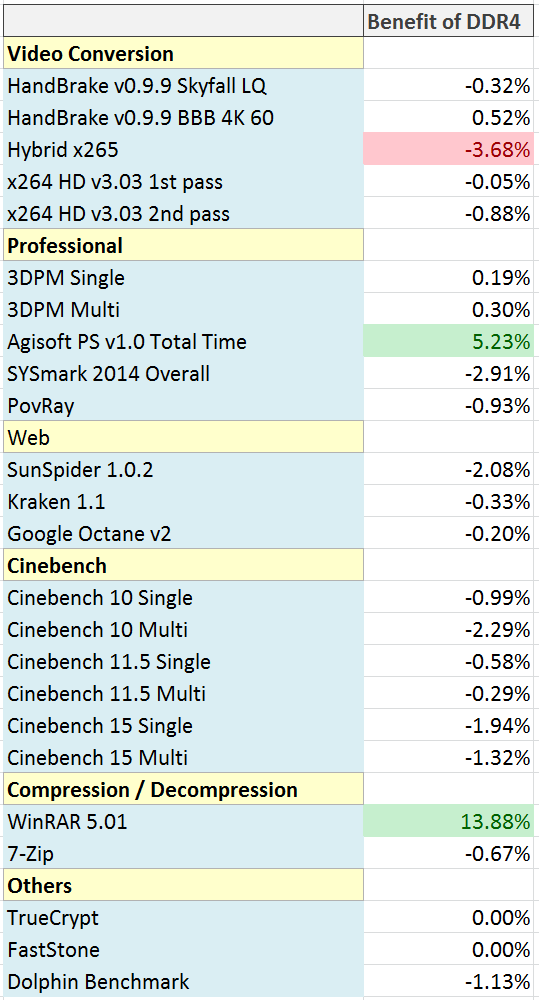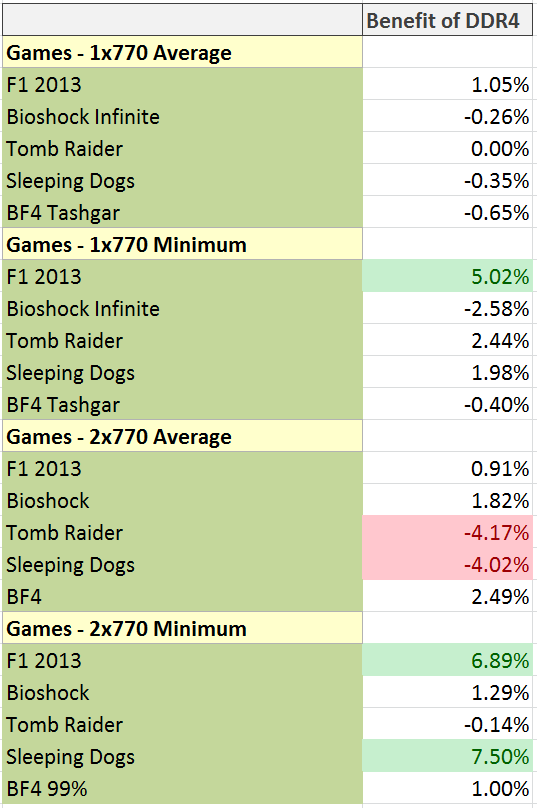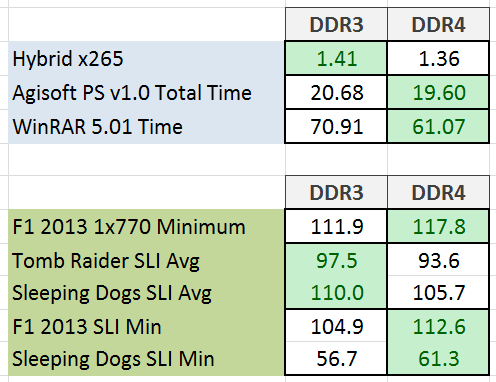DDR4 Haswell-E Scaling Review: 2133 to 3200 with G.Skill, Corsair, ADATA and Crucial
by Ian Cutress on February 5, 2015 10:10 AM ESTComparing DDR3 to DDR4
Moving from a standard DDR3-2133 C11 kit to DDR4-2133 C15, just by looking at the numbers, feels like a downgrade despite what the rest of the system is. Ideally we want the first number, the frequency, to be high and the second number, the latency, to be low. After spending several years dealing with DDR3, moving to DDR4 feels a bit of a backwards step when you look at solely the numbers on paper.
As part of this review we have covered many different areas where DDR4 is the upgrade of DDR3, not only in terms of voltage but some of the underlying concepts as well. This puts DDR4 in a position for upgradability in the future, especially when it comes to density and future technologies (see the next page for more information). But an ultimate question still remains: at the same frequency and latency, do they perform the same?
The only way to perform an identical comparison would be to have a platform that could probe both DDR3 and DDR4 while keeping the same CPU. If one comes along, we will test that, but in the mean time we can do some broad comparisons with near-identical systems.
For this test we took two Haswell based systems and compared them against each other. The first contains the Haswell-E i7-5960X processor, cut it down to run at four cores with no HyperThreading, fixed the CPU speed at 4 GHz and placed the memory into DDR4-2133 14-14-14 350 2T timings. We did the same with the second system, a Haswell based i7-4770K moved it to 4 GHz and making sure it was in 4C/4T mode. The OS was placed into a unique high performance profile and we ran our test suite. The only difference that remained between the two setups was the L2 and L3 cache, which we cannot change unfortunately.
In our non-gaming tests, there is one situation where DDR3 is more than 3% better and two where DDR4 is +3%. It is worth noting that most of the numbers, especially with things like the Web and Cinebench are actually slightly negative.
In the gaming tests, similarly there are more +3% on the side of DDR4. If we do a direct comparison regardless of the percentage, DDR4 wins 11 times compared to DDR3 getting 8, and almost of DDR3’s wins are minor except for two-way SLI. It would seem that for two-way SLI DDR4 at least brings up some of the minimum frame rates.
Pulling out the >3% difference numbers, just to see what the numbers exactly are:
On the face of it, the Hybrid result does not seem that different, whereas a full minute on Photoscan or 10 seconds in our WinRAR test feels like a difference. In the gaming tests moving nearer to 120 FPS or 60 FPS, especially in both of the minimum frame rate tests, is an important jump which happens with DDR4.
Overall, comparing DDR4 to DDR3, there is little difference to separate the two. In a couple of small instances one is better than the other, but on those edge cases it might be prudent to say that we cannot make a final decision until we can synchronize the rest of the system, such as the size of CPU caches. When we can perform such tests, we will run some more numbers.













120 Comments
View All Comments
jabber - Thursday, February 5, 2015 - link
Crikey...I'm still on 16GB of DDR2 ECC! I feel old.foxtrot1_1 - Thursday, February 5, 2015 - link
If you're still running DDR2 it's probably not the RAM that's holding your system back.nathanddrews - Friday, February 6, 2015 - link
Clearly. It's rather sad to see how little impact RAM has on performance... which begs the question of who is buying this stuff? Is the only strength stability during overclocking?III-V - Friday, February 6, 2015 - link
Well Haswell-E users are tied to DDR4, so yeah there's that :)Of course, that's not what you were talking about. Memory bandwidth can have a big effect on certain workloads. IGPs need a bit of it (tapers off hard after 2133 MHz), but I know programs like WinZip and 7-Zip love memory bandwidth. There's certainly a lot of server and HPC workloads that love it too, but for most users, you're certainly right -- it's not worth it at the moment and may not really ever be a concerning bottleneck.
r3loaded - Thursday, February 5, 2015 - link
You mean to say you've not bought a single computer since Core 2? Damn!Murloc - Thursday, February 5, 2015 - link
well do you really need additional CPU power?My overclocked E8500 (with stock cooler) was a beast, there was so much headroom, and I didn't change computer because of it.
Right now I'm on a i5 750 from 2009 or something and it's totally fine. Also my GTX 275 still handles games in full hd just fine although not at max settings and it also becomes hot and only has DX10 so it's obsolete.
So after 6 years, it's only the GPU that could use upgrading, the CPU/RAM part is not bottlenecking anything.
Well not having sata 6 and that limiting my SSD is the one bad thing. I don't have any USB3 pendrives so I don't miss that.
It's technology and power consumption making my CPU/chipset obsolete rather than performance.
Guspaz - Thursday, February 5, 2015 - link
I'm still running a first-gen i7 (Nehalem) as my work computer, and it's still plenty snappy. I've got 12GB of RAM in the thing, and whatever I do have in the way of performance limitations would largely be resolved by sticking an SSD in there.svan1971 - Sunday, February 8, 2015 - link
Get the PX-AG256M6e say goodbye to sata 3 limitations. I put one in an old x58 board and its amazing what a 6 year old 3.6 oc'd i7 can do.mikato - Monday, February 9, 2015 - link
Nice post. I had an E7300 system and I had already upgraded the GPU to a GTX 760 and maxed out memory. It was somewhat slow in the newer games I played (Call of Duty), then I bought an E8500 on ebay and put that in and overclocked it finding a sweet spot, but it was still not quite as fast as I wanted. The poor optimization of COD Ghosts was partly to blame, but I ended up redoing the whole system at that point.I do use an i7-950 Bloomfield at work still and it does just fine.
jabber - Thursday, February 5, 2015 - link
Just in clarify, I'm running a dual quad core 3.33Ghz Xeon setup. Still keeps up with a i7 in a lot of cases. They cost peanuts too.